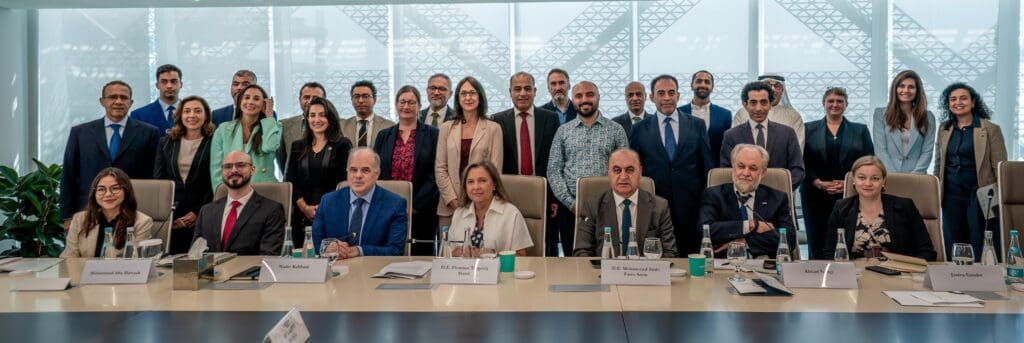The Middle East Council on Global Affairs (ME Council), in collaboration with the Blue Peace Middle East Initiative and the Geneva Water Hub, and with the support of the Embassy of Switzerland in Qatar, hosted a roundtable on water diplomacy and governance in the MENA region on September 28-29, 2025.
The two-day event brought together regional and international experts, policymakers, and academics to address the urgent challenges of water scarcity and transboundary water governance in the Middle East and North Africa (MENA) region. Water resources across the region are under increasing pressure from climate change, declining rainfall, rising evaporation, and overextraction, while political factors such as diplomatic disputes, weak resource management, and armed conflict have further damaged aquifers, lakes, and rivers.
Against this backdrop, the roundtable provided a platform for dialogue to set a common agenda, identify shared policy priorities, and explore multi-sectoral approaches that can improve governance, strengthen cooperation, and contribute to regional stability. Participants focused on three core themes: water for peacebuilding, diplomacy, and governance.
Nader Kabbani, senior fellow and director of the Governance and Development Program at the ME Council, emphasized the importance of such a platform. He explained: “The Middle East is the most water scarce region in the world, and among the most volatile. As such, water governance and diplomacy are vital for the region’s future. Indeed, we are here today to explore how improved transboundary water governance can serve as a foundation for peacebuilding and promoting prosperity across the region.
H.E. Florence Tinguely Mattli, the Ambassador of Switzerland to the State of Qatar, highlighted Switzerland’s commitment to fostering water cooperation: “The Blue Peace Middle East and the Geneva Water Hub initiatives are built on the conviction that water is not fated to be a source of tension — it can be a bridge between communities. By fostering cooperation, enabling dialogue, and grounding decisions in scientific evidence, Switzerland works to make water a tool for diplomacy and mediation.”
Highlighting the need for pragmatic, incremental approaches, Prof. Dr. Ahmet Mete Saatçı, Blue Peace ME Managing Committee Member and Founder of the Turkish Water Institute (SUEN), said: “Given the political sensitivities surrounding transboundary waters, lasting cooperation is best achieved gradually—through confidence-building steps such as joint studies, technical projects, and professional exchanges—which often build more trust than ambitious agreements attempted too soon.”
Participants also examined the potential role of water in supporting political processes across the MENA region, with case studies of river basins and governance frameworks highlighting the importance of cross-sectoral collaboration in agriculture, energy, and urban planning. Emphasizing the broader implications, H.E. Mr. Mohamed Amin Faris Amin, Chair of the Blue Peace ME Managing Committee and Advisor to the President of Iraq, stressed: “We must move beyond viewing water as a zero-sum game where one country’s gain is another’s loss. Instead, we must embrace water cooperation as a foundation for broader regional stability and prosperity.”
The roundtable will culminate in a comprehensive publication that captures the insights and contributions of participants. The report will present practical policy recommendations to advance water diplomacy and governance across the MENA region, providing governments, institutions, and communities with a roadmap for addressing one of the region’s most urgent and complex challenges.
About the Middle East Council on Global Affairs
The Middle East Council on Global Affairs (ME Council) is an independent, non-profit policy research institution based in Doha, Qatar. It conducts policy-relevant research, convenes meetings and dialogues, and engages policy actors on geopolitical and socioeconomic issues specific to the Middle East and North Africa (MENA) region. Serving as a bridge between the MENA region and the rest of the world, the ME Council provides a regional perspective on global policy issues. It also establishes partnerships with other leading research institutions and development organizations across the MENA region and the world.
For media requests:
Mrs. Suzanne El Houssari, communications director shoussari@mecouncil.org

